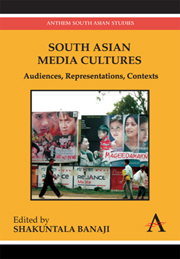Book contents
- Frontmatter
- Contents
- List of Illustrations
- 1 Introduction
- Part One Elaborating Audiences: Meaning, Use and Social Context
- Part Two Telling Texts: Media Discourse, Identity and Politics
- 6 Private Satellite Media and the Geo-Politics of Moderation in Pakistan
- 7 Forgetting to Remember: The Privatisation of the Public, the Economisation of Hindutva, and the Medialisation of Genocide
- 8 Myth – The National Form: Mission Istanbul and Muslim Representation in Hindi Popular Cinema
- 9 A Peace of Soap: Representations of Peace and Conflict in Popular Teledramas in Sri Lanka
- 10 Destigmatising Star Texts – Honour and Shame among Muslim Women in Pakistani Cinema
- Part Three Alternative Producers: The Articulation of (New) Media, Politics and Civic Participation
- List of Contributors
8 - Myth – The National Form: Mission Istanbul and Muslim Representation in Hindi Popular Cinema
from Part Two - Telling Texts: Media Discourse, Identity and Politics
Published online by Cambridge University Press: 05 March 2012
- Frontmatter
- Contents
- List of Illustrations
- 1 Introduction
- Part One Elaborating Audiences: Meaning, Use and Social Context
- Part Two Telling Texts: Media Discourse, Identity and Politics
- 6 Private Satellite Media and the Geo-Politics of Moderation in Pakistan
- 7 Forgetting to Remember: The Privatisation of the Public, the Economisation of Hindutva, and the Medialisation of Genocide
- 8 Myth – The National Form: Mission Istanbul and Muslim Representation in Hindi Popular Cinema
- 9 A Peace of Soap: Representations of Peace and Conflict in Popular Teledramas in Sri Lanka
- 10 Destigmatising Star Texts – Honour and Shame among Muslim Women in Pakistani Cinema
- Part Three Alternative Producers: The Articulation of (New) Media, Politics and Civic Participation
- List of Contributors
Summary
Introduction
During the course of the coverage of the attacks of 26 November 2008 in Bombay, the New Delhi TV (NDTV) anchorperson, Barkha Dutt (whose remarks also open the previous chapter by Britta Ohm) commented upon the resemblance of the events unfolding to those in a film. Another viewer interviewed by NDTV also made the same remark. Both comments expressed disbelief that these were real attacks suggesting that it is possible to become inured to violence and the idea of terrorism in the post 9/11 era, which has become the most represented theme in film contributing to the mythology of Islamic terrorism. In recent films from the Hindi cinema not only is the main subject about terrorism, in some cases the events are played out within the film but on television via simulations of news broadcasts. In Mission Kashmir (2000, dir. Vidhu Vinodh Chopra) Sufi Parvez was a television anchor; in Fanaa (Destruction, 2006 dir. Kunal Kohli) a blind woman befriends a Kashmiri terrorist; in LOC Kargil (2003, dir. J. P. Dutta) Preity Zinta's character became a reporter; the mission in the film Mission Istanbul (July 2008 dir. Apoorva Lakhia. MI hereafter) was to thwart terrorist attacks on Indian cities, with obvious reference to Bombay, a television station owner in Istanbul being identified as the mastermind. The actual reporting by NDTV jounrnalists on 26 November 2008 was no different from much that is depicted within Hindi films.
- Type
- Chapter
- Information
- South Asian Media CulturesAudiences, Representations, Contexts, pp. 145 - 162Publisher: Anthem PressPrint publication year: 2010
- 1
- Cited by



